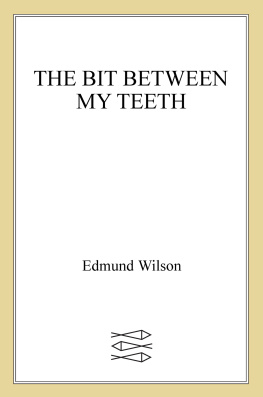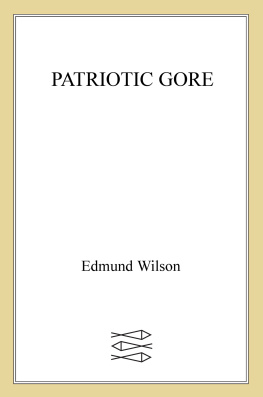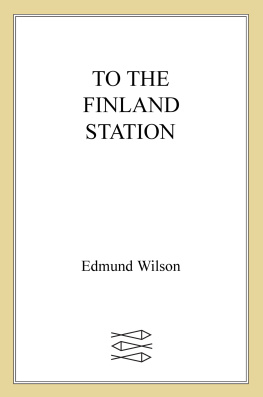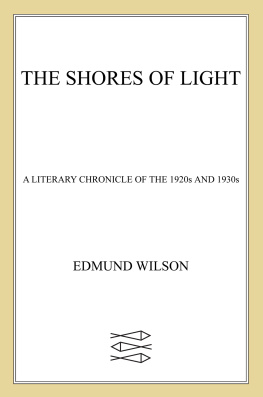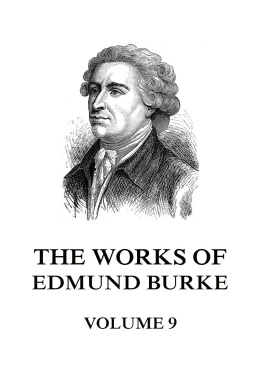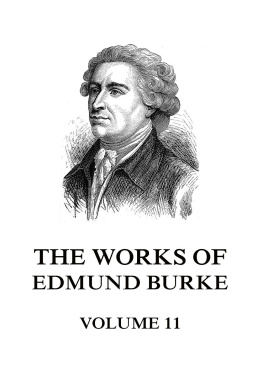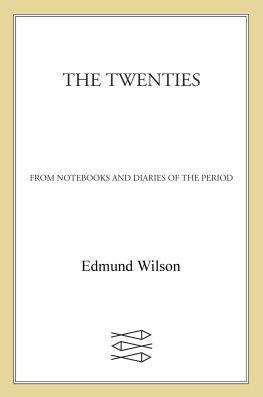Edmund Wilson - The Forties
Here you can read online Edmund Wilson - The Forties full text of the book (entire story) in english for free. Download pdf and epub, get meaning, cover and reviews about this ebook. publisher: Farrar, Straus and Giroux, genre: Detective and thriller. Description of the work, (preface) as well as reviews are available. Best literature library LitArk.com created for fans of good reading and offers a wide selection of genres:
Romance novel
Science fiction
Adventure
Detective
Science
History
Home and family
Prose
Art
Politics
Computer
Non-fiction
Religion
Business
Children
Humor
Choose a favorite category and find really read worthwhile books. Enjoy immersion in the world of imagination, feel the emotions of the characters or learn something new for yourself, make an fascinating discovery.

- Book:The Forties
- Author:
- Publisher:Farrar, Straus and Giroux
- Genre:
- Rating:5 / 5
- Favourites:Add to favourites
- Your mark:
- 100
- 1
- 2
- 3
- 4
- 5
The Forties: summary, description and annotation
We offer to read an annotation, description, summary or preface (depends on what the author of the book "The Forties" wrote himself). If you haven't found the necessary information about the book — write in the comments, we will try to find it.
The Forties — read online for free the complete book (whole text) full work
Below is the text of the book, divided by pages. System saving the place of the last page read, allows you to conveniently read the book "The Forties" online for free, without having to search again every time where you left off. Put a bookmark, and you can go to the page where you finished reading at any time.
Font size:
Interval:
Bookmark:
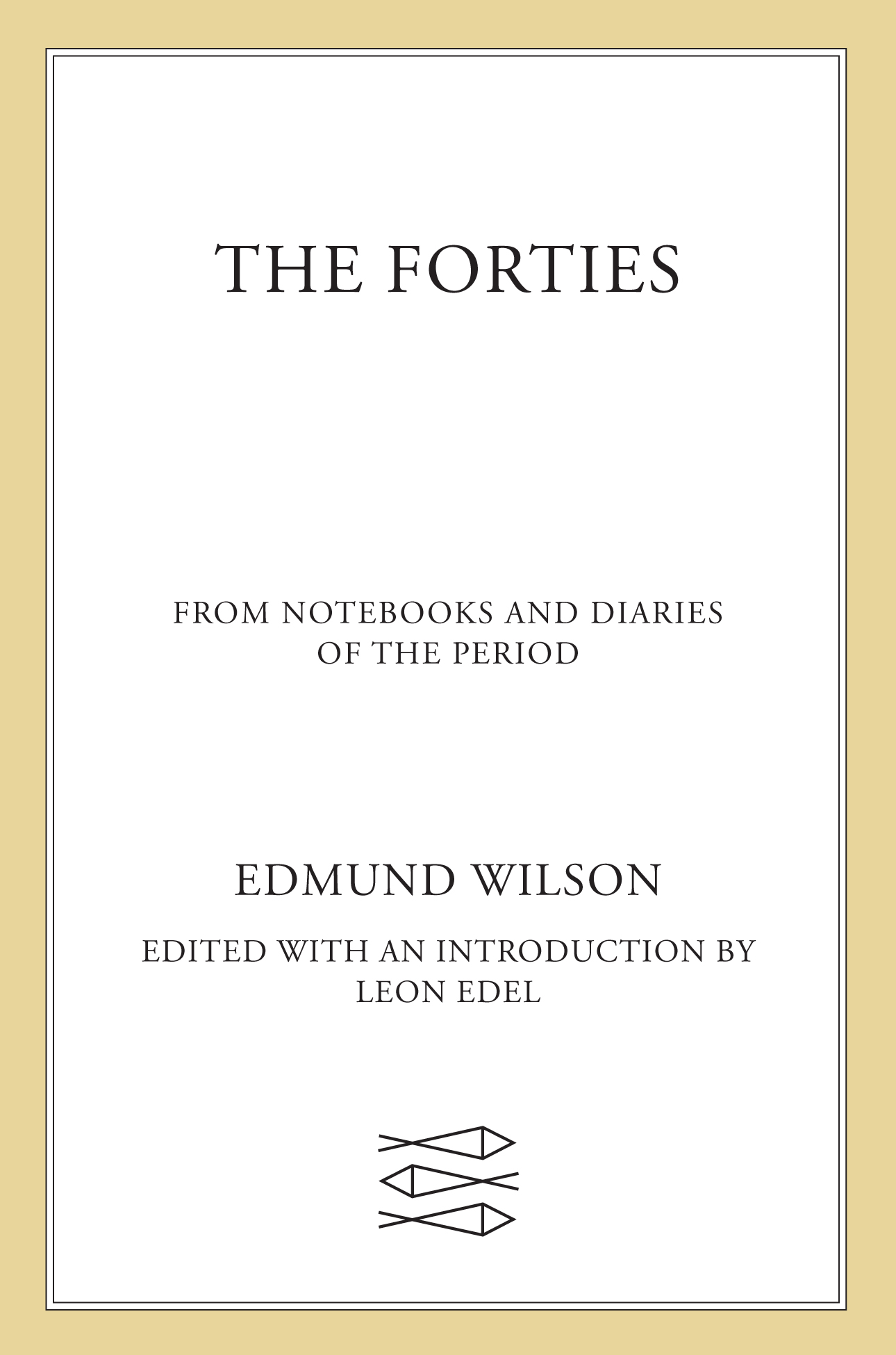
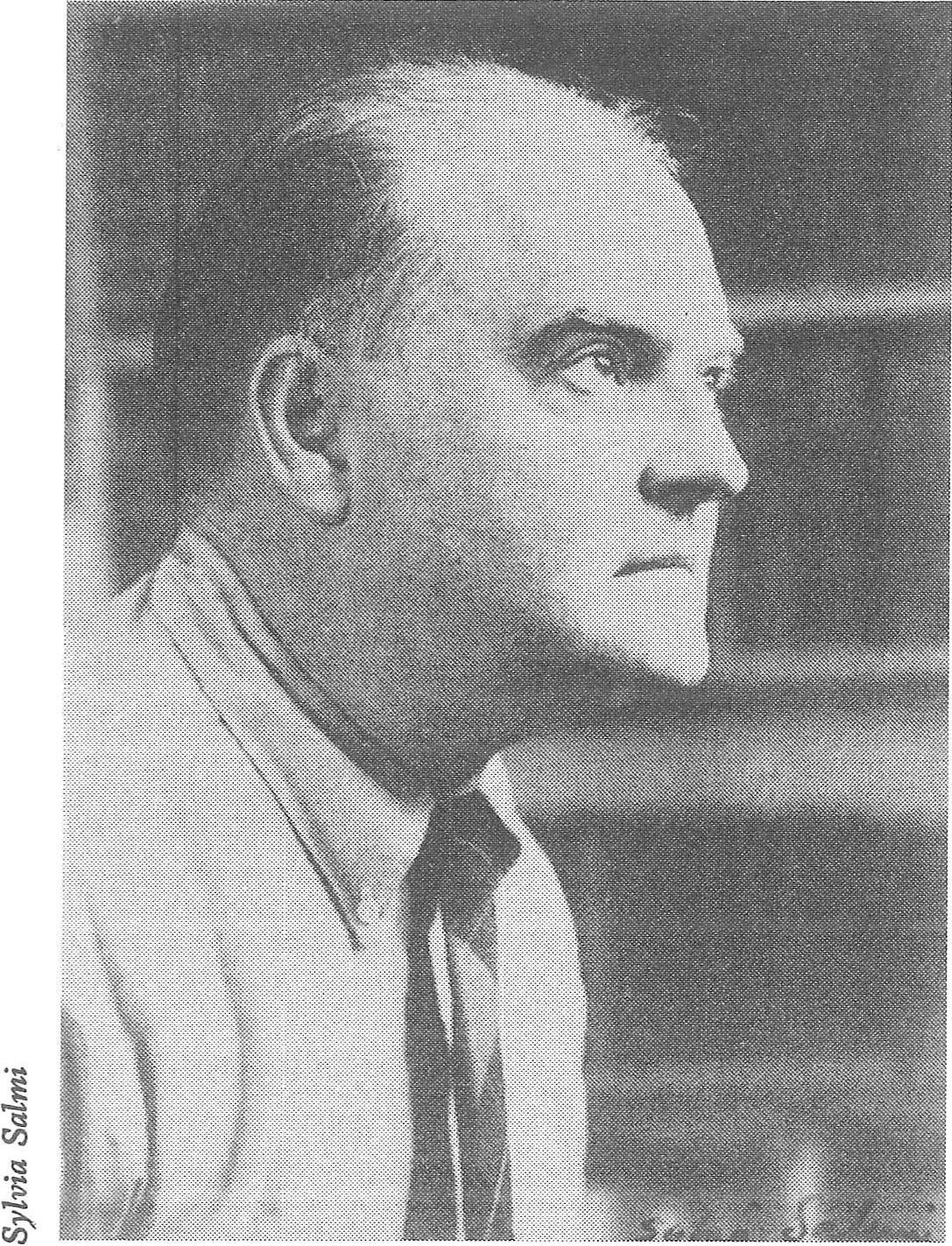
Edmund Wilson

The author and publisher have provided this e-book to you for your personal use only. You may not make this e-book publicly available in any way. Copyright infringement is against the law. If you believe the copy of this e-book you are reading infringes on the authors copyright, please notify the publisher at: us.macmillanusa.com/piracy.
Edmund Wilson
Mary McCarthy and Edmund Wilson, Wellfleet, 1942
The house at Wellfleet
Elena Wilson, Wellfleet
Elena Wilson
Edmund and Helen Miranda Wilson, 1948
Edmund and Reuel Wilson, as photographed by Henri Cartier-Bresson, ca. 1948
Edna St. Vincent Millay and Eugen Boissevain
Holograph from Edmund Wilsons notes of his trip to Haiti, 1949 (Collection of American Literature, The Beinecke Rare Book and Manuscript Library, Yale University)
Edmund Wilsons The Twenties and The Thirties were printed from typescripts he prepared and partially edited before his death. The Forties does not have the benefit of his editing; it is a wholly posthumous book and lacks the retrospective passages Wilson would have written had he been able to put it together. Certain portions are fragmentary; others are very full and require little gloss. A few sections existed in typed form: the European notes, which were extracted from the authors notebooks in the preparation of Europe Without Baedeker; and the account of the Zui, amplified for EWs later book Red, Black, Blond and Olive. The Haiti portion has been assembled from almost illegibly scrawled notesput down on the spot in a kind of semi-shorthand, like a reporters notes. Wilson usually clear-copied such notes into his journals, but in this instance he seems to have expanded them directly into the three articles he wrote for The Reporter, the New York liberal magazine.
The other portions of this volume came from the large-sized ledgers in which he kept his journals. The years from 1940 to 1945 are the scrappiest of all his journal-keeping, and had to be assembled from loose pages and sporadic entries in the back covers of his notebooks. To these I have added the undated scenario for a novel, The Story of the Three Wishes or The Red Bank and Moscow Novel. I also found a few tentative retrospective notes, which I have included. The meagerness of the entries of 194045 results not so much from Wilsons malaise over the war as from the fact (as he said) that he did little journal-keeping during his third marriage, which culminated in divorce.
As before, I have edited the texts with a light hand, in accordance with Wilsons instructions, correcting slips, deleting repetitions, and touching up the punctuationall that he would have done were he preparing the book for his publisher. He did not want to be edited in the academic manner, as if he were a classical text, but insisted that his journalswritten often in haste, and rough at bestshould be treated as any manuscript is treated in a publishers office: tidied up and made ready for the printer. We know that Wilson kept these notebook-journals originally for his own use. They were written hurriedly and he had no intention of checking names or historical facts as he wrote. The result is that we encounter in the manuscript at certain points a question mark in parenthesesWilsons interrogations of himself. The reader must recognize these as part of the tentativeness of the journal; everything was to be set right and verified later, if he should need to use the passage. Readers must take these queries as meaning Was it di or de in that name? or Have I got my spelling right? There are some passages which were clear enough to Wilson, for he would set down some word to jog his memory, but which are a mystery to us. I have left these occasional little mysteries: only Wilson could have explained them, but they suggest the nature of this kind of journal-keeping. Wilson was never afraid to correct his errors: he pretended to none of the omniscience which he saw and deplored in academe. Certain books which he autographed for me contain, beyond the inscription, references to pages where he corrects his own and the printers errors and sometimes writes in an explanatory footnote.
The Forties has benefited from an earlier grant given me by the National Endowment for the Humanities. The death of Edmunds widow, Elena Wilson, occurred just as I was beginning work on this volume and deprived me of a valuable source of information and help. But I am grateful for the continued assistance of EWs older daughter, Rosalind, and his younger, Helen Miranda. Phyllis Stenger, a lecturer at the University of Hawaii, helped with identifications and footnotes, Ella Wiswell with the Russian allusions, Kathleen Falvey with the Italian, and Ines Kinnell checked the typescript against the holograph text. Finally, I want to thank my wife, Marjorie, for reading the entire manuscript when it was completed.
L.E.
The Bit Between My Teeth
In his earlier decades, Edmund Wilson was too busy living to reckon the mounting years. He turned thirty-five at the end of the 1920s but continued into the economic depression with all the energy of his youth. He assayed the American jitters as we have seen in The Thirties. He went to Russia when he turned forty in 1935 and on his return spent five years writing To the Finland Station. But at the end of 1940when he was forty-fivehe suddenly found himself reckoning with his mortality. F. Scott Fitzgerald died in December of that year of a heart attack. Fitzgerald was a year younger than Wilson. At that momentthe moment when he grieved for a writer who had always seemed so much youngerthe aging writer awoke with a shock to the fact of his middle age.
I have felt Scotts death very much, he wrote to his Princeton friend John Peale Bishop (who would also die soon). Men who start writing together write for one another more than they realize till somebody else dies. And then, Wilson observed, its extremely depressing to me that Joyce should have died, tooeven though I suppose his work was finished. Yeats, Freud, Trotsky and Joyce have all gone in so short a timeit is almost like the death of ones father.
Wilson had indeed lost a series of literary and political fathers; they had been important characters in his books Axels Castle and To the Finland Station. But Fitzgerald had hardly been fatherly; he was a kind of younger brother who looked up to Wilson and called him his intellectual conscience. And now, in one brief moment, he had been deprived of his entire future. It was this abrupt termination that deeply upset Wilson: it could so easily happen to him. Gathering Fitzgeralds literary remains into a volume, which included his painful record of his decline into apathy, Wilson used his title The Crack-Upand felt as if he himself was cracking up. His elegiac verses in the opening pages mourn more than the loss of a friend:
Those eyes struck dark, dissolving in a wrecked
And darkened world, that gleam of intellect
That spilled into the spectrum of tune, taste,
Scent, color, living speech, is gone, is lost
Font size:
Interval:
Bookmark:
Similar books «The Forties»
Look at similar books to The Forties. We have selected literature similar in name and meaning in the hope of providing readers with more options to find new, interesting, not yet read works.
Discussion, reviews of the book The Forties and just readers' own opinions. Leave your comments, write what you think about the work, its meaning or the main characters. Specify what exactly you liked and what you didn't like, and why you think so.

